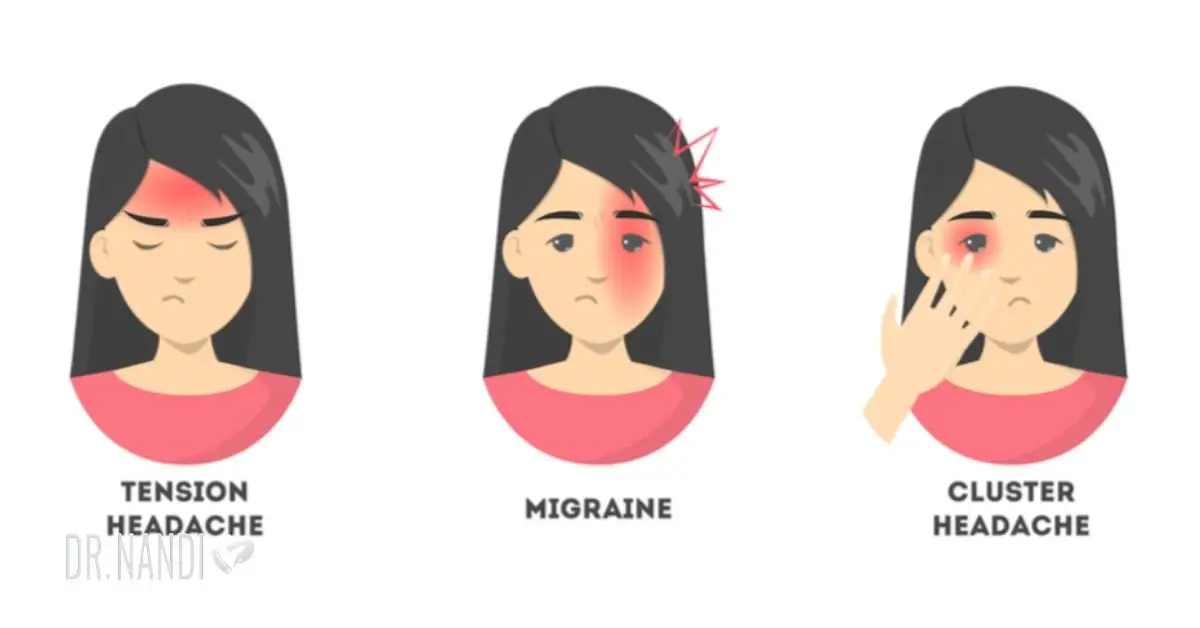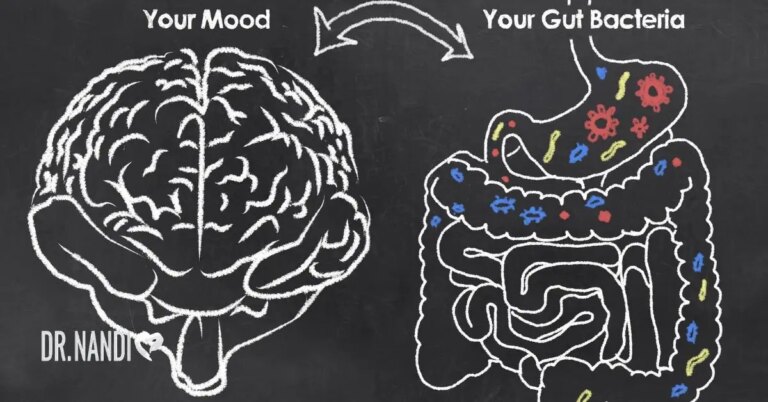Headaches are something I am asked about frequently. People get headaches all the time. In fact, headaches are one of the more common reasons people reach for over-the-counter painkillers like ibuprofen and aspirin.
I see a headache as the body’s way of communicating to you that something could be wrong. It could be that you need to slow down, get more hydration, improve your sleep habits, eat better or change something else in your lifestyle. However, headaches can be a sign of something deeper going on like damage in the gut, high blood pressure, or other, more serious health conditions.
In this article, I would like to discuss the 10 most common types of headaches, how to recognize them, and how to effectively find relief.
There are 150 different types of headaches. However, there are 10 most common types that I see in my patients:
#1 Tension headaches
Tension headaches are the most common type of headache and are usually triggered by stress and fatigue. A tension headache feels like a dull, aching sensation all over your head. You may also feel tenderness/strain in your neck, shoulders, forehead, and scalp.
Remedies
For the occasional tension headache, you can take over-the-counter painkillers like:
- Ibuprofen
- Aspirin
- Naproxen
- Excedrin/caffeine (try not to use late in the day)
Always start with a small dose and go up if needed. Check with your doctor before taking any medications.
If you are getting tension headaches regularly then I would suggest looking closely at your lifestyle habits. Are you getting enough sleep? Are you experiencing too many stressful situations and not enough relaxation/wind-down time? It might be time to slow down a little, spend some time outside, and make some shifts in your life to reduce stress.
You might also consider using:
- Flaxseed.High in omega-3 fatty acids which have been shown to decrease the frequency of headaches. (2)
- Peppermint essential oil. Add one drop to a carrier oil like coconut or argan oil and rub it on the forehead and all around the hairline.
- Scalp massage. This may help to relax the muscles and relieve tension.
- Exercise. Studies have found that regular aerobic activities are effective at decreasing the frequency of tension headaches. (3)
#2 Cluster Headaches
Cluster headaches are a series of headaches that come and go over the course of several hours or even several weeks/months. One might experience a headache that lasts for 15 minutes to 3 hours and then returns several more times over the course of a day or a week.
A cluster headache feels like severe burning or piercing pain in one spot on the head or face. Other symptoms may include nasal congestion and eye tearing on the same side as the headache, redness, flushing, and/or sweating.
Cluster headaches are most common in the spring and fall and happen more in men than in women.
Remedies
If you are experiencing severe pain from cluster headaches, here are some things your doctor might offer:
- Oxygen therapy. A mask is placed gently over your face so you can inhale 100% oxygen for a set amount of time. Most who use this therapy find dramatic relief. It also generally carries no side effects.
- Triptans.An injectable form of simatriptan which is a common treatment for migraine headaches but is also effective for acute cluster headaches. There is also a nasal spray version but it does not always offer the same relief.
- Octreotide.An injectable synthetic version of the brain hormone somatostatin. It is an effective treatment for some patients.
- Local anesthetics. Sometimes doctors will offer intranasal (through the nose) local anesthetics like lidocaine which may help to numb out the pain.
- Dihydroergotamine.Another injectable medication that main help ease the pain of cluster headaches.
If cluster headaches are a recurring problem for you then the best plan of action is to focus on preventative strategies. Here are a few things your doctor might suggest:
- Avoid alcohol.
- Stick to a normal sleep schedule, and aim to get between 7-9 hours of sleep a night.
- Melatonin. Some small studies have found that 10 milligrams of melatonin taken in the evening might reduce the frequency of cluster headaches. (4)
- Calcium channel blockers. This is a popular choice for preventing recurring cluster headaches.
- Corticosteroids. These are anti-inflammatory drugs that may be appropriate for the short-term prevention of cluster headaches. Because they have side effects if taken long-term, doctors generally only prescribe them to be taken for a few days.
- Lithium carbonate. Normally a treatment for patients with bipolar disorder, this medication also seems to help prevent cluster headaches.
- Nerve block. This is when a doctor injects a numbing agent (anesthetic) and corticosteroid into the area around the occipital nerve, which might help reduce the frequency and/or pain of a cluster headache.
Will cluster headaches go away?
A cluster headache will normally go away on its own but in many patients, it will eventually return. Although the exact cause of most cluster headaches is unknown, many studies suggest they have something to do with abnormalities in the body’s biological clock. Because of this, staying on a proper sleep schedule and getting enough sleep may help to reduce symptoms. (5)
#3 Sinus Headaches
A sinus or allergy-induced headache is a symptom of an allergic reaction. They often occur during allergy seasons and primarily affect those with chronic allergies or who are susceptible to sinusitis.
A sinus headache is felt in the front of your head and in your sinuses. The inflammation in your sinuses can also cause pain in your cheeks and the bridge of your nose. Sinus headaches may be a sign of a sinus infection.
Remedies
Sinus headaches are usually treated by using medications that decrease inflammation and sinus pressure. These may include over-the-counter or prescribed pharmaceuticals such as:
- Nasal steroid sprays
- Deocongestantslike Sudafed PE
- Antihistamines like Zyrtec D Allergy +Congestion
There are also many natural remedies you may want to try while suffering from a sinus headache:
- Neti Pot. Flush your sinus cavity using a saline/water solution in a neti pot.
- Saline nose spray. You can find these at most grocery stores.
- Hot, steamy shower. Take a shower and let the steam fill your nasal cavity to loosen mucus. The hot water may also help relieve pain from your headache.
- Spicy foods. Eating spicy foods is another way to clear your sinuses quickly.
- Humidifier. Dry air makes sinus pressure/pain worse. A humidifier will help to loosen the pressure in your nose and reduce the pain as well.
- Warm compress. Soak a washcloth in hot water then gently lay it over your nose and eyes. This will help to relieve pressure.
- Drink plenty of warm fluids. Staying hydrated will prevent the build-up of hard mucus and will help to flush out the infection.
#4 Migraine headaches
Migraines are generally the most debilitating type of headache and cause intense, deep, pulsing pain inside your head. They may be one-sided or may be felt around your entire head. They will make you sensitive to light and sound. It is not uncommon for migraine sufferers to also experience nausea.
One in five people who have migraines may also experience visual disturbances that cause them to see flashing lights, zigzag lines, stars, or blind spots.
Migraines can be caused by genetics, nervous system conditions, post-traumatic stress disorder, severe food allergies, PMS, environmental factors, and exposure to chemicals. Women are 3 times more likely to experience migraines than men. (6)
Remedies
Sometimes over-the-counter medications like ibuprofen may take the edge off a migraine enough that no further treatment is necessary. However, often times OTC medications are not strong enough and a doctor may prescribe one of the following:
- Triptans(anti-inflammatory, change blood flow in the brain)Sumatriptan (Imitrex)Rizatriptan (Maxalt)Rizatriptan (Axert)
Triptans may come in pills, nasal sprays, or injections.
If migraines become a chronic problem, a doctor is likely to suggest using a preventative medication. While only 3%-13% of patients with migraines actually use preventative medications, research suggests that 38% need them. By preventing a migraine entirely you can improve your quality of life and productivity. (7)
Here is a list of common preventative medications for migraines:
- (Inderal) Propranolol
- (Toprol) Metoprolol
- Topiramate(Topamax)
- Amitriptyline
Some migraine sufferers have gotten a daith ear piercing. Although further studies are needed to confirm a daith piercing as an effective migraine preventative treatment, many people claim they experience fewer migraine symptoms after receiving it. (9)
#5 Hormonal headaches
Hormone imbalance, especially when estrogen is involved, can cause headaches or menstrual migraines. As you’d expect, these types of headaches most often occur in women. Menstruation, hormonal birth control, pregnancy, and post-partum may all affect estrogen levels which result in headaches and other symptoms.
Hormone headaches affect everyone differently, but often they have similar symptoms as tension headaches or in severe cases, migraines. You will be able to know if it is hormone-related if it aligns when any of the aforementioned conditions.
Women who regularly suffer from migraine headaches are 60% more likely to have hormone-related headaches. (8)
Remedies
The most common over-the-counter medications for hormone-related headaches are:
- Naproxen(Aleve)
When this and other natural remedies do not work, a doctor may prescribe:
- Frovatriptan(Frova)
Natural solutions for hormone headaches include:
- Relaxation/decreasing stressDetox bath (Epsom salts, lavender oil)MassageChiropractic adjustmentSleep
- Yoga
- Acupuncture
- Avoiding common allergens in diet(gluten, dairy, soy)
- Magnesium
- Peppermint & Lavender essential oils
- B-complex vitamins
- Iron supplements
- Staying hydrated
#6 Caffeine headaches
There are two ways you can get a caffeine headache: having way too much caffeine or quitting caffeine cold turkey. You may also experience a caffeine headache if you skip your usual cup of coffee. This is also referred to as “caffeine rebound.”
The funny thing about caffeine is it is also an effective headache treatment when used appropriately. Studies have found that by combining caffeine with medications such as acetaminophen and aspirin, the pain-relieving effect increases by 40%. (10)
Caffeine headaches tend to be fairly minor on the pain scale but can be uncomfortable. Generally, they are a wide-spread ache that starts in the forehead and moves throughout the head or throbbing pain in a particular area.
Remedies
If you are experiencing a caffeine withdrawal headache, the most logical remedy is to consume caffeine. The moment you start to feel a dull aching behind your eyes, drink your regular amount of caffeine (or slightly less if you want to wean yourself slowly). You can also take a medication like:
- Excedrin
- Ibuprofen
- Acetaminophen
- Aspirin
- Naproxen
For a caffeine overdose headache, use any of the above medications except Excedrin. The following natural remedies may also be helpful.
- Drink plenty of water
- Sleep
- Ground(sit outside on a conductive surface, preferably grass or bare earth)
- Cold compress(for no more than 20 minutes at a time)
#7 Exertion headaches
Exertion headaches occur suddenly after intense physical activity. Interval training, running, sports, weight lifting, and even sexual intercourse can cause a post-activity headache. These are believed to occur because of increased blood flow in the head.
Exertion headaches feel like throbbing pain on both sides of your head. They don’t generally last more than a few minutes but may continue for an hour or more. If these happen to you frequently they may be a sign of an underlying medical condition and it would be a good idea to consult with your doctor.
If this headache is accompanied by other symptoms such as vomiting, double vision, rigidity in the neck or unconsciousness see a doctor right away.
Remedies
If an exertion headache lasts for more than a few minutes, try a low dose of over-the-counter pain medication such as:
- Ibuprofen
- Aspirin
Other natural remedies include:
- Ginger. Drink some ginger tea, and ginger root juice, or take a ginger supplement. This is most effective as a preventative means, taken prior to physical activity.
- Massage.
- Drinking plenty of water.
- Warm up properly before exercise.
- Eat plenty of nutrient-dense whole foods.
#8 Hypertension headaches
Hypertension headaches are serious and should be treated by a doctor immediately. They happen due to dangerously high blood pressure levels. A hypertension headache feels like intense painful pulsing and is often accompanied by changes in vision, tingling, nosebleed, chest pain, shortness of breath, and numbness.
If you are being treated for high blood pressure or are at risk for high blood pressure, these headaches are more likely to happen and are considered a medical emergency.
Once blood pressure returns to normal the pain should also subside.
Remedies
With any headache that you believe is related to high blood pressure, medical attention should be sought immediately. If high blood pressure is indeed a problem, a doctor is most likely to recommend:
- A strict, very healthy diet for controlling high blood pressure(often known as the dash diet)Lots of fruits and vegetables reduces intake of foods high in trans and saturated fats whole grainsFishPoultryNuts and seedsLow sodiumLittle to no sweets, sugary drinks very small consumption of red meatsLow-fat or no dairy
- Consistent exercise
- Hypertension medication
While experiencing a mild hypertension headache, the following may help provide relief:
- A cool cloth on the forehead
- Sitting in a dark room
- Over-the-counter pain medicationsIbuprofenAspirin
#9 Rebound headaches
Rebound headaches are caused by the overuse of certain medications. The pain is usually similar to a tension headache or in severe cases, a migraine. If you use over-the-counter pain relievers like acetaminophen, aspirin, naproxen, or ibuprofen more than 15 days out of the month, a rebound headache is more likely to occur.
Remedies
Unfortunately, the only way to help rebound headaches is to slowly stop using as many pain medications. If you are taking a lot of pain relievers, work with your doctors to find other solutions or to treat the root cause of your health concerns. They may have pain-relief suggestions that will not cause rebound headaches.
#10 Post-traumatic headaches
Post-traumatic headaches develop due to a head injury. Even a minor injury to the head may result in painful, tension-like headaches. These begin within 7 days of the injury and can last for several months or even a year, depending on the severity of the head trauma.
Remedies
If over-the-counter pain relief methods do not seem to work, a doctor might prescribe one of the following to control pain:
- Triptans
- Sumatriptan
- Beta-blockers
- Amitrptyline
Some other non-drug remedies may include:
- Physical therapy
- Psychological therapy/support
- Biofeedback/relaxation therapy
- Nerve stimulators
- Cognitive behavioral therapies
Recommended Supplements for All Types of Headaches
A large body of literature suggests a relationship between magnesium deficiency and mild and moderate tension-type headaches and migraines. One study found that people who took magnesium supplements had migraines on 43% fewer days than others given the empty placebo pills. Several of the other studies found that magnesium users had fewer migraine attacks than nonusers. I recommend my patients suffering from headaches try supplementing with Magnesium Essentials as a first step intervention given the overall health benefits vs low risk – it makes sense to take magnesium daily to help prevent the onset of headaches.
When To See A Doctor
Everyone experiences headaches once in a while. If you are experiencing headaches for 15 days or more out of a calendar month, it is possible you have either a chronic headache condition or another medical problem and should seek treatment through a doctor.
You should also see a doctor if you are experiencing symptoms of a hypertension headache, a migraine accompanied by vomiting and neck rigidity, or a severe headache that lasts more than 48 hours.
Which Headaches Are Dangerous?
Here are 6 signs a headache may be dangerous and you should seek professional medical attention:
- When you have little to no history of headaches and are suddenly struck with a painful, life-disrupting headache accompanied by vision impairment.
- A headache that comes on VERY suddenly and peaks in intense pain within 60 seconds, persists, and subsides within an hour. Possibly accompanied by nausea, vomiting, and mental confusion.
- A progressive headache with any kind of numbness and weakness.
- A sudden, intensive headache accompanied by neck pain.
- Headaches that come on in the days/weeks after risky sexual intercourse when you had no headaches prior.
- A headache accompanied by a stiff neck, fever, and mental disorientation.
Headaches With Pregnancy
Many pregnant women begin to experience painful headaches or migraines during their first trimester. They may come and go throughout the pregnancy but are the most common during the first and third trimesters.
What Causes Headaches During Pregnancy?
A lot of pregnancy-related headaches have to do with hormones. During the first trimester, certain hormones increase dramatically and may contribute to headaches and other uncomfortable symptoms in some women. The headaches may also be related to:
- Getting less sleep
- Low blood sugar
- Reduced calorie intake from nausea/vomiting
- Dehydration
- Caffeine withdrawal
- Stress
Headaches during the third trimester are more often related to poor posture or tension from carrying around the extra weight of the fetus.
Remedies For Headaches/Migraines In Pregnancy
- Listen to your body. Get plenty of rest.
- Regular massage and chiropractic care
- Prenatal yoga
- Meditation
- Practice good posture, wear supportive bands/clothing as needed
- Keep exercising as you did before pregnancy (or if you rarely exercised, try to do low-stress workouts such as brisk walking)
- Eat a well-balanced diet
- Eat smaller, more frequent meals versus big, spread-out meals
- Apply hot or cold packs to your head
If your headaches become severe or unmanageable with natural means, work with your healthcare provider to decide what other pain relief methods may be appropriate for pregnancy.
Frequently Asked Questions
Q. Will headaches raise blood pressure?
A. They can but if your blood pressure is elevated with a headache, see a doctor immediately.
Q. Can headaches kill you?
A. Most headaches are not dangerous nor lethal. However, if you experience any of the 6 warning signs mentioned above, seek medical attention immediately as these may be symptoms of a potentially lethal condition.
Q. Can headaches cause seizures?
A. A headache will not cause a seizure but may be a symptom of one.
Q. Can headaches cause memory loss?
A. A headache generally won’t cause memory loss on its own, but in rare instances, headaches may be a sign of an underlying medical condition that could be associated with memory loss.
Q. Why do I get headaches during my period?
A. Headaches often occur to women during their menstrual cycle due to changing hormone levels. Estrogen levels seem to be the most likely cause of headaches during a women’s period.
Q Will spinal headaches go away?
A. Spinal headaches occur in the weeks and in months after one undergoes a spinal tap or spinal anesthesia. Most of the time, these headaches go away on their own without treatment. If they last more than 24 hours a doctor may offer prescriptive pain-relief solutions.
Q. Can a headache cause fever?
A. A headache will not normally cause a fever but may be accompanied by one if there is an underlying condition such as the flu, HIV, or another infection.
Q. Can a headache cause vomiting?
A. Some people may experience nausea-related vomiting during severe headaches or migraines.
Q. Can headaches cause brain damage?
A. There is some evidence that frequent migraines may cause an increased likelihood of brain lesions. For this reason, most doctors take chronic migraine conditions very seriously. (11)
Conclusion
Headaches are just another way your body communicates to you that something is going on. If natural remedies do not help, work with your medical professional to determine the best plan of action for you and your unique situation. There is no need to live with debilitating pain. Find a doctor you trust and work together as a team to uncover the root cause of your headaches.
References:
- Headaches – Types, Causes, Symptoms, Diagnosis, Treatment (webmd.com)
- Supplementation with omega-3 polyunsaturated fatty acids in the management of recurrent migraines in adolescents – PubMed (nih.gov)
- Aerobic Exercise for Reducing Migraine Burden: Mechanisms, Markers, and Models of Change Processes – PMC (nih.gov)
- Melatonin versus placebo in the prophylaxis of cluster headache: a double-blind pilot study with parallel groups – PubMed (nih.gov)
- Neurobiology and sleep disorders in cluster headache – PMC (nih.gov)
- Sex Matters: Evaluating Sex and Gender in Migraine and Headache Research – PMC (nih.gov)
- Preventive treatment in migraine and the new US guidelines – PMC (nih.gov)
- Daith Piercing in a Case of Chronic Migraine: A Possible Vagal Modulation – PMC (nih.gov)
- Excedrin Migraine (acetaminophen/aspirin/caffeine) dose, indications, adverse effects, interactions… from PDR.net
- Do Migraines Lead to Brain Damage? – ABC News (go.com)











 Subscribe to Ask Dr. Nandi YouTube Channel
Subscribe to Ask Dr. Nandi YouTube Channel









